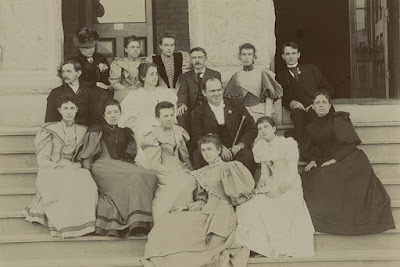Edward Jacob Forney was a truly remarkable man. Born in Lincoln County, North Carolina in 1860, he witnessed the Civil War, Reconstruction, and two World Wars before his death in 1948 at 80 years old. One of his earliest memories was watching a Northern soldier shooting out the windows of his family home.
Forney attended Newton public schools and then Catawba College. He was an ambitious student, teaching himself Latin and shorthand. After graduation, he spent his early years working as an auditor with the Southern Railroad in Columbia, South Carolina, before moving to Raleigh to take the position of Secretary to the State Superintendent of Public Instruction.
In 1891, while working for the state, Forney met Charles Duncan McIver, an early advocate for women’s education and future president of the State Normal and Industrial School (now UNC Greensboro). McIver was so impressed with Forney, that he hired him as his personal secretary. He was particularly qualified for this position, as he was an early proponent of shorthand, and he was one of the first people in North Carolina who could operate a typewriter.
When the State Normal opened in 1892, Forney was asked to join the faculty. Initially, he acted as secretary to McIver, but soon, his sole responsibilities were as treasurer and as an instructor of “commercial subjects.” Those subjects included shorthand, typing, commercial law, bookkeeping, and telegraphy. This was a vital curriculum for the state’s young women, as it offered them an opportunity to be trained to work in an office and gain a measure of independence.
The program was fairly advanced, suggesting students complete an elementary correspondence course in shorthand before entering college, then proceed to more difficult classes when they officially enrolled. They were exposed to the most current technology, contributing to their marketability in the workforce. Students were able to complete the early commercial program in less than a year, with additional time if they took extended coursework. Certificates of completion were awarded by President McIver at Commencement. As the program’s reputation spread, Forney also taught courses in surrounding towns, and he wrote a text that was used at the State Normal and other technical schools. The commercial program would continue to thrive at the college, graduating over 4,000 students before Forney’s retirement in 1940.
But Forney’s influence spread far beyond the walls of State Normal. In addition to his work at the college, he created a budget accounting system for the state of North Carolina. He also worked independently as an accountant and served as the city of Greensboro’s auditor. Even further from the realm of academia, he created an agricultural “subsoiler” to attach to plows, improving farm work for North Carolina farmers.
Forney continued his duties as treasurer of the school until he retired 1940, although he gave up the position of head of the commercial program a few years earlier. He was succeeded in both positions by George M. Joyce.
During the last several months of his life, Forney’s health began to fail and he was moved to a nursing facility. He died on January 29, 1948, 21 hours before his wife Annie and only several months shy of their 60th wedding anniversary. The couple were buried in a double funeral at Green Hill Cemetery. They were survived by their 6 children.
Forney was remembered fondly by his students and colleagues. He was described as energetic and enthusiastic, with a keen wit and lively, if somewhat sarcastic, sense of humor. At the end of his life, Forney was fond of saying, that he had not had one dull day in eighty years. In 1957, the campus’ Carnegie Library was remodeled to serve as a classroom and renamed in his memory.
By Kathelene McCarty Smith



